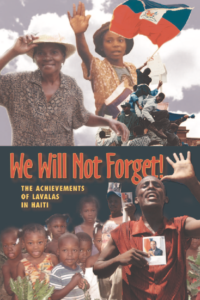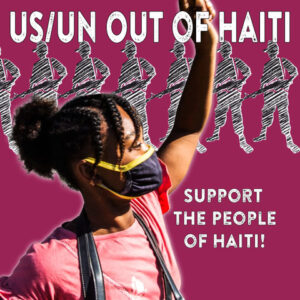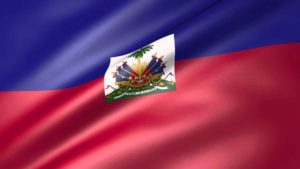A Brief Haiti Action Committee Primer
On February 29, 2004, the democratically elected government of President Jean-Bertrand Aristide of Haiti was overthrown by a violent coup. This was the second US-sponsored coup against a popularly elected Aristide government, the first one taking place in 1991 after he had served only eight months in office.
Orchestrated by the United States, France and Canada, and then sanctioned and enforced by a United Nations military occupation, the 2004 coup forced President Aristide, his wife and colleague, Mildred Trouillot Aristide, and their two children into exile, and removed more than 8,000 elected officials. Thousands more were killed, raped or forced to flee their homes. The country has still not recovered.
 The coup shattered the work of the most progressive government in Haiti’s history. In the period of governance by Fanmi Lavalas, the party founded by President Aristide, more schools were built than the total constructed between 1804 and 1994. Twenty percent of the country’s budget was mandated for education. Women’s groups and popular organizations helped coordinate a literacy campaign that brought over 320,000 people, mostly women, into literacy classes in over 20,000 literacy centers. The minimum wage was doubled. A powerful initiative was undertaken to combat the spread of HIV/AIDS. Health clinics were established in the poorest communities. The government also launched an aggressive campaign to collect unpaid taxes owed by the wealthy elite. Aristide disbanded the notorious Haitian military, and empowered women’s and victims’ groups to bring cases against the military for its use of rape as a political weapon.
The coup shattered the work of the most progressive government in Haiti’s history. In the period of governance by Fanmi Lavalas, the party founded by President Aristide, more schools were built than the total constructed between 1804 and 1994. Twenty percent of the country’s budget was mandated for education. Women’s groups and popular organizations helped coordinate a literacy campaign that brought over 320,000 people, mostly women, into literacy classes in over 20,000 literacy centers. The minimum wage was doubled. A powerful initiative was undertaken to combat the spread of HIV/AIDS. Health clinics were established in the poorest communities. The government also launched an aggressive campaign to collect unpaid taxes owed by the wealthy elite. Aristide disbanded the notorious Haitian military, and empowered women’s and victims’ groups to bring cases against the military for its use of rape as a political weapon.
In the months after the 2004 coup, Haitians courageously demonstrated their support for Aristide and his Fanmi Lavalas political party, raising five fingers in a call for him to complete his five year term. Their resistance has never stopped.
The 2004 coup was the continuation of a centuries-old attack on Haitian sovereignty. In 1791, 400,000 Africans enslaved in Haiti rose up against French colonial rule, launching a revolutionary war that culminated in Haiti’s independence in 1804, establishing the world’s first Black republic. From that moment on, Haiti has been in the crosshairs of white supremacist imperial powers. The United States led a worldwide boycott against Haiti and refused to recognize the new republic until 1864, knowing that Haiti was an inspiration to enslaved people everywhere and posed a grave danger to the US’s own system of slavery. In 1825, French warships encircled Port-au-Prince and forced Haiti to assume a debt to France of 90 million gold francs (equivalent to $21.7 billion today) as reparations to their former slave owners for the “crime” of freeing themselves from slavery. With the first payment of the debt, Haiti had to close its nascent public school system. In 1915, the US invaded Haiti and occupied the country for 19 years, taking over Haiti’s banking system, defeating a peasant-led insurgency and installing one puppet regime after another, culminating with the Duvalier dictatorships which terrorized the country for close to 30 years. Today we see the same US policies at work, once again devastating Haitian society.
The Crisis In Haiti Today
The current crisis in Haiti stands as a sharp rebuke to those who plotted and carried out the coup in 2004, and to the foreign occupation that has bedeviled Haiti ever since. There are currently no elected officials in Haiti, the result of years of rule by decree by imposed and illegitimate governments. Under the watchful eyes of the US and its so-called Core Group of foreign occupiers, Haiti has descended into what grassroots organizers have called a “hell on earth.”
As the year 2025 begins, people across the length and breadth of Haiti have been demanding an end to the terror unleashed by Viv Ansamn, a coalition of paramilitary death squads aligned with and emboldened by sectors of the business elite and government. Community self-defense groups have formed to resist the incursions of the death squads. In the last year alone, over 6000 Haitians have been killed by these paramilitaries, and more than one million Haitians have had to flee their homes. Nearly half the population is facing acute hunger, as roads are blocked and markets attacked. Tens of thousands of children have been unable to attend schools. Gang rapes have become the norm as paramilitaries escalate their attacks on opposition communities. The despised Haitian Army, disbanded by President Aristide in 1995, has been reconstituted, readying itself to commit yet more human rights violations.
A recently formed transitional presidential council, demanded for years by Fanmi Lavalas and other grassroots organizations as a stepping stone towards free and fair elections, has been sabotaged by the US State Department, which has made sure it is dominated by the same right-wing parties that have produced what Haitians call a “slow motion genocide.” These parties have long been in bed with the paramilitaries and show no interest in stopping their assaults against the population.
Building Solidarity
As the Trump Administration takes hold, we are witnessing renewed attacks on progressive and democratic forces within Haiti, as well as the targeting of Haitians living within US borders. Throughout their election campaign, Trump and Vance demonized Haitians. Already, as part of his attacks on migrants, Trump has issued executive orders ending Temporary Protected Status (TPS) for over 500,000 Haitians now in the United States. And he has ended the Humanitarian Parole Program for Nicaraguans, Haitians, Venezuelans and Cubans, threatening hundreds of thousands more migrants with deportation. Trump has vowed to detain 30,000 migrants in the infamous prison at Guantanamo Bay – and we know that many of those detainees will be Haitians.
Haiti Action Committee has stood with the popular movement in Haiti since our founding in 1992. We have maintained our solidarity through the 2004 coup, the deadly earthquake of 2010, the joyous return of President Aristide in 2011, the stolen elections of 2015 and 2016, the devastation unleashed by Hurricane Matthew in 2016, and the earthquake that struck Haiti’s southern peninsula in August 2021. We have continued to support Haitian refugees who have fled the terror unleashed by one US-backed reactionary regime after another. Now we are standing with the Haitian grassroots movement as it provides support to a population under daily attack, defends communities, and continues to develop and sustain programs to build a new, just and democratic Haiti.
This is a time to buttress our solidarity. We hope you will join us in our work.
Contact Haiti Action Committee at action.haiti@gmail.com
To support the vital work of Haiti’s grassroots movement, please donate to the Haiti Emergency Relief Fund at www.haitiemergencyrelief.org


